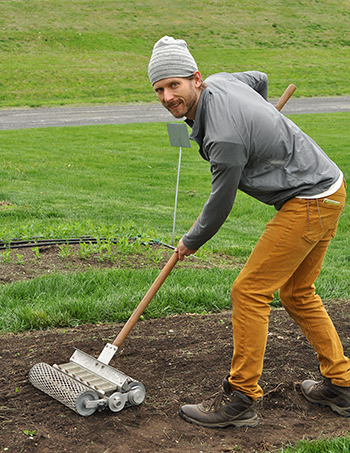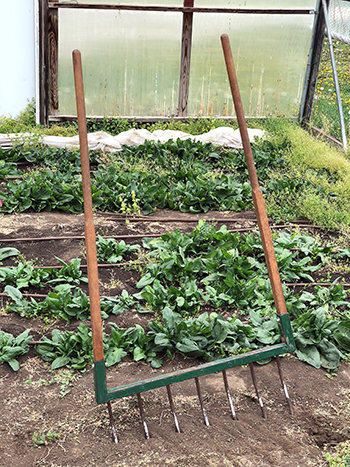Slow Tools for Small Farms and Home Gardens
Return to Vegetables Agent Articles
 Slow food, slow money, slow farm … slow tools?
Slow food, slow money, slow farm … slow tools?
The global trend of revisiting “old-fashioned” techniques to enhance the sustainability of our economies, agriculture and diets has come to the small tool industry — especially those sold for farms and gardens.
Old tools finding new popularity in modern local foods movements
The slow tools movement is taking design and manufacturing concepts of the past (i.e., small and/or local production, built by craftspeople, hand and horse powered implements) to improve efficiency in the small market farms and homestead gardens that have become increasingly popular.
Slow tools better suited to today's smaller urban gardens and farms
Groups of engineers, farmers and general tinkerers are organizing to revive tools like the finger weeder, tilther (cordless drilled powered tiller), and precision push seeders more suited to the small garden scale.
Jack Algiere, farmer at Stone Barns Center in Hudson Valley, New York and trailblazer of their slow tools initiative says, “The problem is that there hasn’t been a set of tools for small-scale, diversified farms since 1940.”
Tools for lower environmental impact
 Take the broadfork, for example. It’s a wide garden fork with long tines capable of breaking up deep compaction and aerating a raised garden bed with just gentle rocking motion. It’s also known as the “manual tiller”, and it’s gone through a serious resurgence in the small farm community over the last few years. This heavy-duty hand tool had fallen out of usage in favor of gas powered cultivators. But with the growing consideration for life in our soil food web, like the larger beneficial worms and fungi which are unnecessarily disturbed by more modern machines, the broadfork is now being widely adopted by farmers and gardeners alike.
Take the broadfork, for example. It’s a wide garden fork with long tines capable of breaking up deep compaction and aerating a raised garden bed with just gentle rocking motion. It’s also known as the “manual tiller”, and it’s gone through a serious resurgence in the small farm community over the last few years. This heavy-duty hand tool had fallen out of usage in favor of gas powered cultivators. But with the growing consideration for life in our soil food web, like the larger beneficial worms and fungi which are unnecessarily disturbed by more modern machines, the broadfork is now being widely adopted by farmers and gardeners alike.
The adulation for slow tools has been in large part to rock-star farmers/authors/inventors like Eliot Colman and Jean Martin Fortier, who actually named his Quebec farm after the broadfork (Les Jardins de la Grelinette). And the success of their farming methods has motivated low-emission tools to be sought after more and more for their effectiveness, ergonomics, and ingenious simplicity.
Zach Hoppenstedt, Horticulture Small Farms Agent
Have questions? The Garden Hotline is staffed by trained EMG volunteers and Extension staff who will assist you with questions.
Phone: (913) 715-7050
Email: garden.help@jocogov.org